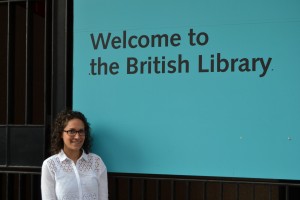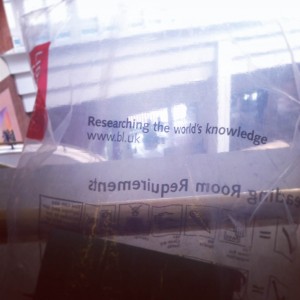
Thanks to UVM and the Peter J. Seybolt Faculty Fund in Asian Studies, I’ve been in London this summer, working in the British Library‘s vast collections. It isn’t my first time using the Library, and specifically, its India Office Collection (explore a fraction of this collection here); I’ve used my visits here to read Persian and Sanskrit manuscripts, records of the Mughal Empire and East India Company, and various other documents, prints, and pamphlets as I chase footnotes and weave my project(s) together.
It is nothing short of humbling to research at the British Library: beyond the processes involved in getting and maintaining access to the collection, this is the home of some of the world’s most important intellectual, cultural, political, and scientific stores. The original Alice in Wonderland? Magna Carta? Da Vinci’s notebooks? Check. Stunning illuminated texts, including Bibles and Qur’ans and medieval texts from across the world? Yup. Handwritten, one-of-a-kind manuscripts in every language I can think of–and languages I can’t entirely locate? Of course. Someone like me–an historian of religions, and specifically of religions in India–can spend countless hours in archives and libraries because I find books magical; the impact of the collection in which I am currently working is not lost on me, and it is imposing.
It is, then, no wonder that the Library’s Reading Room tag line is “Researching the world’s knowledge.” Certainly, they’ve got holdings that span time, place, and language, and, if my colleagues (my Reading Room-mates, as it were) are any representation of the patrons writ large, the researchers themselves span age groups, nationalities, and native languages.
My latest research focuses on the idea of Muslims as subjects of the British Indian Empire. Right now, as I’m in the thick of it, I’m reading texts by East India Company officers (Hindus, Muslims, and Brits), by muftis and qazis (Muslim religious experts), by Muslim and British political activists on all parts of the political spectrum; I’m reading minutes of Parlimentary hearings spanning 1780-1890; and I’m reading compiled histories of India and its religions written by the original armchair historians, themselves never having visited the Subcontinent (and, in some cases, never having learned an Indic or Islamicate language). I’m trying to get lots of sides to a what I think will turn out to be a great story; this is, at any rate, my sense of good research–a great story that speaks to issues beyond its own minutiae.
I’m researching multiple voices, in multiple languages, from multiple (though, historically speaking, cogent) decades and even centuries, from multiple locations–and I’m doing it all in London. I’m researching the world’s knowledge in London. The Empire’s legacies allow me to do this work, here; so while I research the legacies of imperial and colonial power upon religious actors, I, too, participate in this legacy. My participation is part of what it means to research the world’s knowledge: the story I might tell is not only one of historical events and ideas, but of how that historical moment continues to contour our present.
That’s the story I’m telling, and I’ll stick to it, until the information points me elsewhere. I’ll be posting more updates as it unfolds.

